

Cloud mystery solved: Global temperatures to rise at least 4°C by 2100. December 31, 2013.
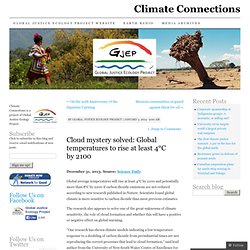
Source: Science Daily Global average temperatures will rise at least 4°C by 2100 and potentially more than 8°C by 2200 if carbon dioxide emissions are not reduced according to new research published in Nature. Scientists found global climate is more sensitive to carbon dioxide than most previous estimates. On defense: Cities get serious about climate resilience in 2013. If 2012 was the year a changing climate beat U.S. cities like Apollo beat Rocky, 2013 may go down as the year that urban America hit the meat locker and got serious about defending itself.

Thanks to disasters like Superstorm Sandy, being “green” is no longer just a tired trend. The notion of becoming “environmentally friendly” has morphed into a mandate to buttress ourselves against an environment that has become decidedly unfriendly to us. And the antics in Congress this year make it abundantly clear that, as sustainable communities activist Rob Hopkins told me recently, the cavalry is not coming; it’s up to cities to devise plans for keeping cool in the hot times ahead.
Suriname MP urges adoption of environment law drafted by citizens' group. Looming Danger of Abrupt Climate Change. The National Research Council of the National Academies (NRCNA) has pre-published (available to the public as of Dec. 2013), an extensive 200-pg study: “Abrupt Impacts of Climate Change, Anticipating Surprises.”

The goal of the report is to prepare society to anticipate the ‘otherwise unanticipated’ before it occurs, including abrupt changes to the ocean, atmosphere, ecosystems and high latitude regions. Abrupt Impacts of Climate Change: Public Briefing. Brief report. National Academies Newsroom. Date: Dec. 3, 2013 New Report Calls for Attention to Abrupt Impacts From Climate Change, Emphasizes Need for Early Warning System WASHINGTON -- Climate change has increased concern over possible large and rapid changes in the physical climate system, which includes the Earth's atmosphere, land surfaces, and oceans.
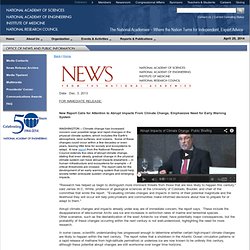
Full report. Climate is changing, forced out of the range of the past million years by levels of carbon dioxide and other greenhouse gases not seen in the Earth's atmosphere for a very, very long time.
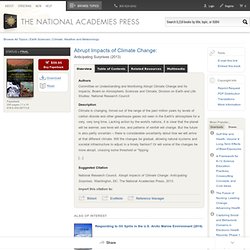
Lacking action by the world's nations, it is clear that the planet will be warmer, sea level will rise, and patterns of rainfall will change. But the future is also partly uncertain -- there is considerable uncertainty about how we will arrive at that different climate. Will the changes be gradual, allowing natural systems and societal infrastructure to adjust in a timely fashion? Or will some of the changes be more abrupt, crossing some threshold or "tipping point" to change so fast that the time between when a problem is recognized and when action is required shrinks to the point where orderly adaptation is not possible?
Under Arctic Ice, Photographer Captures Climate Shifts In Earth's Most Rapidly Changing Place. What does the future hold for the parts of the world that will be most affected by Earth's warming climate?
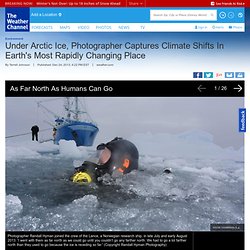
This spring and summer, St. Louis-based photojournalist Randall Hyman spent four months getting a preview in Arctic Norway, a place he's visited again and again since the mid-1970s. What struck him most on this trip, a Fulbright Scholarship project between April and August, was a pace of change that "has really picked up in the last decade," Hyman said, since trips he made there in 2006 and 2007. "In that short space, less than a decade, right away I'm seeing differences like where the fisheries are richest, which ones are thriving and which ones are dying off," he added. Hyman – whose career also has taken him to the jungles of Peru and the Amazon rainforests of Brazil – spent his four months in Norway mostly traveling throughout the Svalbard archipelago, a cluster of islands that lies about halfway between the mainland and the North Pole. The Arctic is very, very rich. SOS 54 years ago warned about vanishing glaciers. L'Australie accusée de "lâcheté" pour la pêche à la baleine - Monde.
23.12.2013, 07:39 - Monde Actualisé le 23.12.13, 07:41.

Le monde enregistre en 2013 son mois de novembre le plus chaud depuis 1880. Washington (AFP) - Le monde a connu cette année son mois de novembre le plus chaud depuis le début des relevés de températures en 1880, a indiqué mardi l'Agence américaine océanique et atmosphérique (NOAA).

Le mois dernier a aussi été le 37e mois de novembre consécutif et le 345e mois d'affilée avec une température moyenne dans les terres et à la surface des océans supérieure à celle du 20e siècle. En novembre, la température moyenne dans les terres et à la surface des océans a ainsi atteint 13,68 degrés, soit 0,78 degré au-dessus de la moyenne du siècle dernier qui a été de 12,9 degrés, a précisé la NOAA dans un communiqué. Northern Europe under the worst storm since 1953 - Powerful Atlantic storm named Xaver, the worst since 1953, has tracked east to the north of Scotland overnight, bringing very strong winds across northern parts of the UK.
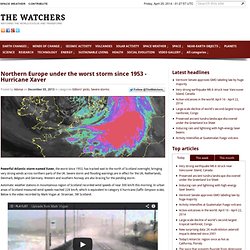
Severe storm and flooding warnings are in effect for the UK, Netherlands, Denmark, Belgium and Germany. Western and southern Norway are also bracing for the pending storm. Automatic weather stations in mountainous region of Scotland recorded wind speeds of near 300 km/h this morning. PERGAMON 16'